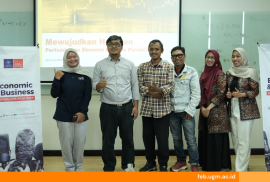On Thursday (25/6) the Department of Economics, Faculty of Economics and Business, University of Gadjah Mada (FEB UGM) held SinarKu: Seminar and Public Lecture with the headline ” Primary Data Collection Through Surveys”. At this time, SinarKu discusses how to collect primary data through surveys and how the data can influence decision making. Covid-19 pandemic caused SinarKU to have limitations to be carried out offline, therefore this time SinarKu was carried out online by using the Cisco Webex platform. Even so, it did not affect the enthusiasm of the participants to attend the seminar, evidently 142 participants have participated in enlivening the discussion both from academics and the general public. Shima Dewi Mutiara Trisna, SE., M.Sc was presented as a moderator who led the discussion with the guest speaker, Anna Triana Falentina, Ph.D. from the Directorate for Development of Census and Survey Methodology of the Central Bureau of Statistics.
Anna began the discussion by discussing the data which is currently the most important commodity for decision making. She shared generally that there are three types of data collections namely registration data, census data, and survey data. According to her, the these three types of data collections have different characteristics. The registration data is individually recorded by each institution, it could save time and money indeed, but it has limited characteristics. Census Data uses data collection methods that cover the entire population, although it has less accuracy, but positively, census data can present data to the smallest area. Meanwhile, the survey data are the data obtained by collecting data from a portion of the population with the aim of obtaining variables that are more detailed and are suitable with the needs. Anna gave an example of survey data with a crime case. “We can take the example of criminality data, from a number of samples taken, we need more samples to be able to obtain data that rarely happens”, she explained.
Anna continued the discussion about the stages of conducting the survey, including the planning stage which includes determining the survey objectives and target population, the preparation stage is started with sample selection and monitoring in the field, the implementation stage which contained data collection in the field, and the processing stage to the presentation. Anna also explained how to design a survey. The first is determining the survey objectives, what will be generated from the survey, what is the target population, and what level of generalization will be presented. Then, what is needed is to prepare a sample frame that is related to the target population of the survey, and determine how many samples are sufficient to describe the population. He criticized related to the habits of the students to get the number of samples. “Usually for research, students use the Slovin Formula. However, when it is viewed from the application of an ideal sample design, the Slovin Formula does not reflect anything about the characteristics of our research unit,” she said. He suggested to use the Multiple Indicator Cluster Survey (MICS) method to obtain the characteristics better and the information was not enough, he added that there were also other factors that were quite influential on the survey design, including the allocation of samples, sample selection, sampling error, and data collection methods. From the presentation, Anna concluded that the core of the survey design is how we take and use the sample data to draw conclusions towards the population, and ensure that survey objectives are met with good precision.
When we are asked about what challenges occurred during the Covid-19 pandemic, Anna said that the Covid-19 pandemic was not an obstacle. According to her, despite the current changes in the mode of data collection, surveys are still important and will never subside despite of the pandemic. In fact, more surveys will be conducted, especially for the government. This is due to the government’s need for surveys to respond to policy making responses both during the pandemic and post-pandemic, as well as needing instruments to continue the data series. She added that the pandemic also eventually forces to redesign the survey by adjusting the sampling strategy and the relevant data collection modes. “This pandemic needs a more flexible approach, but it has little impact on data quality,” she said. However, she cautioned that public access to technology must also be considered. Because when internet penetration is very low, surveys with internet or mobile modes will increase bias. It must be ensured that residents with unfavorable backgrounds can enter the frame when the mode is used.
Translator: Laras OIA




